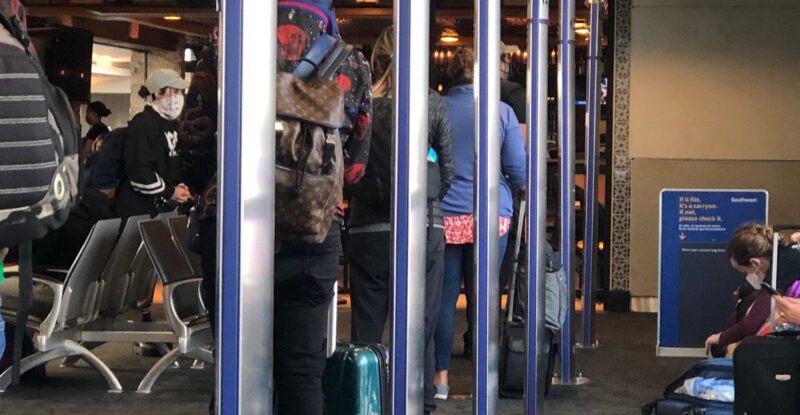 The U.S. Department of Transportation (DOT) today announced plans to launch a new rulemaking that is aimed at requiring airlines to provide compensation and cover expenses for amenities such as meals, hotels, and rebooking when airlines are responsible for stranding passengers.
The U.S. Department of Transportation (DOT) today announced plans to launch a new rulemaking that is aimed at requiring airlines to provide compensation and cover expenses for amenities such as meals, hotels, and rebooking when airlines are responsible for stranding passengers.
After a two-year DOT push to improve the passenger experience, the ten largest airlines guarantee meals and free rebooking on the same airline and nine guarantee hotel accommodations as part of the Department’s Airline Customer Service Dashboard. DOT expanded the dashboard today at FlightRights.Gov to highlight which airlines currently offer cash compensation, provide travel credits or vouchers, or award frequent flyer miles when they cause flight delays or cancellations.
DOT’s planned rulemaking would make passenger compensation and amenities mandatory so that travelers are taken care of when airlines cause flight disruptions.
“When an airline causes a flight cancellation or delay, passengers should not foot the bill,” said U.S. Transportation Secretary Pete Buttigieg. “This rule would, for the first time in U.S. history, propose to require airlines to compensate passengers and cover expenses such as meals, hotels, and rebooking in cases where the airline has caused a cancellation or significant delay.”
The planned rulemaking is aimed at addressing:
- Compensation for passengers when there is a controllable airline cancellation or significant delay;
- A meal or meal voucher, overnight accommodations, ground transportation to and from the hotel, and rebooking for controllable delays or cancellations;
- Timely customer service during and after periods of widespread flight irregularities; and
- Definition of a controllable cancellation or delay.
In addition to announcing plans to initiate a rulemaking that would strengthen consumer protections, the Department has launched FlightRights.Gov and expanded its Airline Customer Service Dashboard to give travelers more transparency about the types of compensation, if any, airlines currently guarantee when they are the cause of a cancelation or delay. The following categories were added to Commitments for Controllable Cancellations and Controllable Delays:
- Cash compensation when cancellation or delay results in passenger waiting 3 hours or more from the scheduled departure time;
- Travel credit/voucher when cancellation or delay results in passenger waiting for 3 hours or more for scheduled departure time; and
- Frequent flyer miles when cancellation or delay results in passenger waiting for 3 hours or more for a flight from the scheduled departure time.
Currently, one airline guarantees frequent flyer miles, and two airlines guarantee travel credits or vouchers as compensation if passengers experience significant delays or cancellations that are caused by something within the airline’s control, such as a mechanical issue.
No airline guarantees cash compensation when an airline issue causes the significant delay or cancellation. The Department’s rulemaking proposes to ensure that passengers experiencing controllable delays and cancellations are better protected from financial losses than is the case today. The Department plans to define “controllable cancellation and delay” in this rulemaking. Also, the Department believes that this rulemaking could result in improved airline on-time performance.
Today’s announcement builds upon work that DOT has been pushing on for the last two years. Last summer, Secretary Buttigieg urged to improve their customer service plans before the release of the Airline Customer Service Dashboard. Airlines responded. Before the Secretary’s letter, none of the 10 largest U.S. airlines guaranteed meals or hotels when the airline was at fault for a delay or cancellation. Now, all 10 guarantee meals and nine guarantee hotel accommodations when an airline issue causes the delay or cancellation.
During the past two years, DOT has taken other unprecedented action to ensure the traveling public is protected, including:
- Last year, DOT issued the largest fines in the history of the Department’s Office of Aviation Consumer Protection—helping to get hundreds of thousands of people hundreds of millions of dollars back. And since 2021, DOT has helped return more than $1 billion in refunds to travelers.
- Earlier this year, Secretary Buttigieg pressed airlines to commit to fee-free family seating. Before his urging, no airline committed to guaranteeing a parent or caregiver could sit next to a child aged 13 or under without paying junk fees. Now three airlines have committed to guaranteeing fee-free family seating, and DOT is pursuing a rulemaking that would require all airlines to do so. Secretary Buttigieg also submitted to Congress a legislative proposal to require that airlines provide fee-free family seating. To further assist consumers in assessing airline family seating commitments, last month, DOT rolled out a new family seating dashboard that highlights the airlines that guarantee fee-free family seating, and those that do not, making it easier for parents to avoid paying junk fees to sit with their children when they fly.
- The Department’s proposed rule on Airline Ticket Refunds, if adopted, would: 1) require airlines to proactively inform passengers that they have a right to receive a refund when a flight is canceled or significantly changed, and 2) define a significant change and cancellation that would entitle a consumer to a refund as more than three hours for a domestic flight, and more than six hours for an international flight. The rule would also 3) require airlines to provide non-expiring vouchers or travel credits when people cannot travel because they have COVID-19 or other communicable diseases; and 4) require airlines that receive significant government assistance in the future related to a pandemic to issue refunds instead of non-expiring travel credits or vouchers when passengers are unable or advised not to travel because of a serious communicable disease.
- The Department has proposed a rule that would significantly strengthen protections for consumers by ensuring that they have access to certain fee information before they purchase their airline tickets. Under the proposed rule, airlines and travel search websites would have to disclose upfront—the first time an airfare is displayed—any fees charged to sit with your child, for changing or cancelling your flight, and for checked or carry-on baggage. The proposal seeks to provide customers the information they need to choose the best deal. Otherwise, surprise fees can add up quickly and overcome what may look at first to be a cheap fare.
- The Department has proposed a rule to refund passengers for services they paid for that are not actually provided (e.g., broken WiFi).
Featured image credited to istock.com/JakeOlimb










